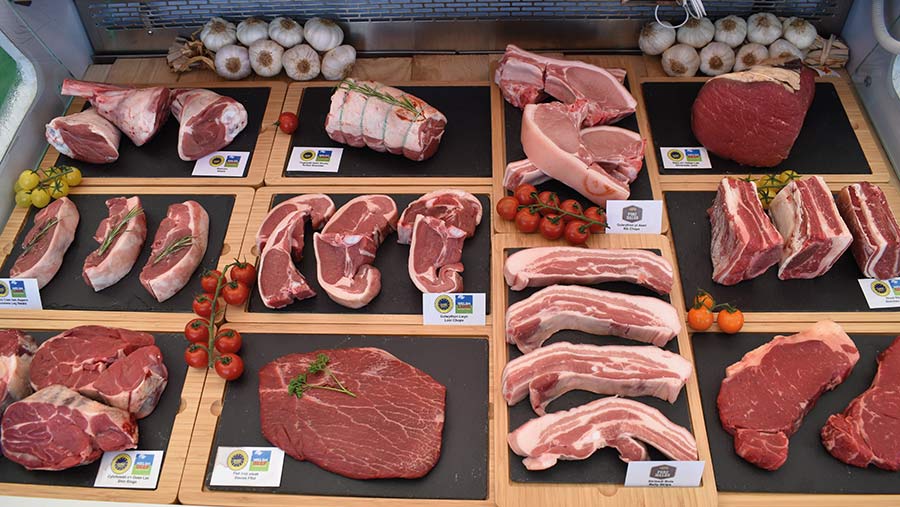UK-India trade deal to reshape food exports
 © Hybu Cig Cymru
© Hybu Cig Cymru The UK and India have signed a landmark free-trade agreement, the most significant since Brexit, aimed at deepening economic ties between the two nations.
For the UK food and farming sectors, the deal promises new market opportunities but also raises concerns.
The UK’s Department for Business and Trade (DBT) said the deal will “lock in” reductions on 90% of tariff lines, with 85% becoming “fully tariff-free” within 10 years.
See also: What a trade deal with India could mean for UK agriculture
A central feature of the agreement is the substantial reduction in Indian tariffs on British agricultural exports.
For example, lamb exports – previously subject to 33% import duties – will become tariff-free, boosting their competitiveness in the Indian market.
“This is excellent news for our lamb processing members” said Tony Goodger, head of communications at the Association of Independent Meat Traders (Aims).
“Be it our premium brands such as Welsh PGI Lamb and Scotch PGI Lamb for the rapidly growing middle class, or our high-quality assured Halal lamb for India’s 200 million Muslim consumers, the UK has a great opportunity in this market.
“We will be seeking clarification from DBT over the coming days as to whether pork and pet food, both of which have active export health certificates in place, are likely to see similar tariff easements over time.”
Whisky and gin tariffs slashed
Whisky and gin tariffs will be halved from 150% to 75%, before reducing to 40% by year ten of the deal.
Mark Kent, chief executive of the Scotch Whisky Association, described the tariff reductions on Scotch whisky exports as “transformational” for the industry.
“[This] has the potential to increase Scotch Whisky exports to India by £1bn over the next five years, creating 1,200 jobs across the UK,” he said.
“It will also give discerning consumers in India far greater choice of brands, as more SME Scotch whisky producers have the opportunity to enter the market.”
In addition, the UK government says the agreement includes provisions for easier customs procedures and improved market access for UK food exporters.
These measures aim to streamline the export process, potentially increasing the volume and variety of British food products reaching Indian shelves.
UK consumers are expected to see a broader range of affordable Indian food products, such as frozen prawns, entering the market.
These imports are anticipated to diversify choices and potentially lower prices for certain food items.
Concerns over standards
However, the influx of cheaper Indian food imports raises concerns among UK farmers and environmental groups.
Farming and environmental organisations warn some Indian agricultural practices, including the use of pesticides banned in the UK, could undermine domestic farming standards and pose health risks to consumers.
Nick Mole, policy manager at the Pesticide Action Network UK (PAN UK), warned the deal might lead to increased exposure to harmful pesticides, as Indian food exports often contain higher levels of pesticide residues.
Furthermore, the potential for increased competition from subsidised Indian produce could pressure UK farmers, particularly in sectors such as lamb and poultry, where production costs are higher.
This dynamic might challenge the profitability and sustainability of domestic farming operations.
“We have already seen how potentially harmful trade deals can be for farmers with the Australia deal,” Mr Mole said.
“Trade deals with India and others cannot undermine UK farmers or consumer safety.”
The UK government said the UK’s points-based immigration system will not be affected by the deal.
However, improved UK-India ties could indirectly support future labour mobility talks – potentially paving the way for skilled Sikh farmers to work on UK dairy farms, though no such provisions are included in the current trade deal.
Economic implications
The UK government estimates the UK-India trade deal will add £4.8bn a year to the UK economy by 2040 and increase bilateral trade by £25.5bn.
The government also anticipates the agreement will boost wages by £2.2bn each year in the long term.
Prime minister Sir Keir Starmer, who spoke to Indian prime minister Narendra Modi to finalise the agreement, hailed it as a milestone moment.
“Today we have agreed a landmark deal with India – one of the fastest growing economies in the world, which will grow the economy and deliver for British people and business,” Sir Keir said.
